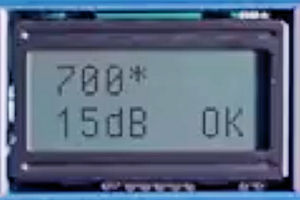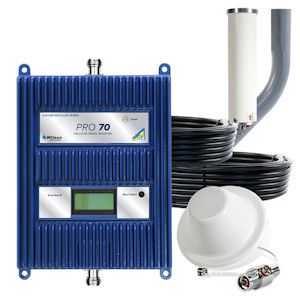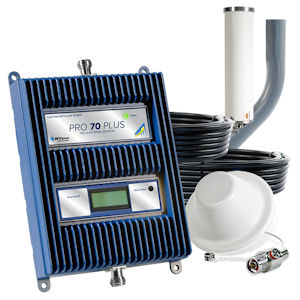What are the differences between the WilsonPro 70 and WilsonPro 70 Plus?
WilsonPro 70 (465134) vs. WilsonPro 70 Plus (463127/463227)
Updated
In this article we’ll review the 50-ohm versions of the WilsonPro 70 and 70 Plus.
The WilsonPro Pro 70 was discontinued 2019, and the WilsonPro 70 Plus was discontinued in .
Price
- WilsonPro 70: started at $1,099 ()
- WilsonPro 70 Plus: started at $1,099.99 ()
Since early the price for the WilsonPro 70 Plus has dropped from $1,799.99 to $1,099.99. During that time, Wilson Electronics retired the WilsonPro 70 and introduced the WilsonPro 1100, so the Pro 70 Plus became their entry-level commercial cellular booster.
Considering the Pro 70 Plus’s power and features, it’s a tremendous value.
Booster design
- WilsonPro 70: Metal housing
- WilsonPro 70 Plus: Metal housing
Both amplifiers use the same metal housing—the only difference between them is the label on the front of the unit.
Both boosters receive power from a standard 120-volt wall outlet and use the same power supply (the Wilson 859900).
Gain
Gain is the booster’s increase in the signal strength it receives from the outside antenna, measured in dB (decibels).
- The WilsonPro 70: +70 dB maximum gain
- The WilsonPro 70 Plus: +70 dB maximum gain
Both units have the same gain. 70 dB gain is typical for commercial boosters.
Uplink power
Uplink is the power output, expressed decibel milliwatts (dBm), that the booster uses to communicate with cell towers. The more uplink power, the greater the booster’s ability to communicate with distant towers.
- The WilsonPro 70: 22.2 dBm average across all bands
- The WilsonPro 70 Plus: 22.2 dBm average across all bands
The WilsonPro 70 and WilsonPro 70 Plus have identical uplink power specifications.
Downlink power
Downlink is the power output, expressed decibel milliwatts (dBm), that the booster uses to communicate with cellphones and other cellular devices inside the building.
- The WilsonPro 70: −1.0 dBm average across all bands
- The WilsonPro 70 Plus: 10.4 dBm average across all bands
This is where the two amplifiers differ most: The WilsonPro 70 Plus has over ten times more downlink power than the WilsonPro 70. The additional downlink power in the WilsonPro 70 Plus gives it the ability to handle more users—essentially, it has a bigger “pipeline.” This is critical for businesses that have more simultaneous users and greater demands on cellular data usage.
LCD display
 WilsonPro 70/
WilsonPro 70/- WilsonPro 70: LCD panel with signal meter
- WilsonPro 70 Plus: LCD panel with signal meter
Wilson’s weBoost consumer products use LED lights to indicate the booster’s status; the WilsonPro series of boosters uses an LCD display panel. A button next to the display allows the user to cycle through the four cellular bands received by the amplifier in order to verify that each is functioning properly.
Connectors
- WilsonPro 70: N connectors
- WilsonPro 70 Plus: N connectors
The 50-ohm WilsonPro 70 and WilsonPro 70 Plus use the robust N connectors found in most commercial-grade systems.
Coax cable
- WilsonPro 70: 400-type (−3.7 dB signal loss per 100 feet) or ½-inch FPE or plenum air (−2.0 dB loss/100 feet)
- WilsonPro 70 Plus: 400-type (−3.7 dB signal loss per 100 feet) or ½-inch FPE or plenum air (−2.0 dB loss/100 feet)
Both 50-ohm systems come standard with 400-type coax cable. Powerful Signal also offers upgraded ½-inch coax cable with nearly half the signal loss of 400 cable, allowing for longer runs of cable in large buildings.
See our Complete Guide to Coax Cable for more information about types of cable for cell signal booster systems.
Antennas
- WilsonPro 70: inside dome or panel/
outside omni or LPDA - WilsonPro 70 Plus: inside dome or panel/
outside omni or LPDA
The WilsonPro 70 and WilsonPro 70 Plus use the same 50-ohm antennas. Powerful Signal offers several antenna configurations for the WilsonPro 70 Plus.
Best uses
- WilsonPro 70: Large home or small office, moderate number of users
- WilsonPro 70 Plus: Large home or small office, larger number of users
The WilsonPro 70 was one of Powerful Signal’s most popular systems and was an excellent choice for large homes and small offices.
The WilsonPro 70 Plus replaced the discontinued Pro 70 as the preferred model for buildings where better performance is needed with heavier user loads.
Need help choosing the best WilsonPro system?
The experts at Powerful Signal have been improving cellular reception in buildings of all sizes since 2007. Please call us at 435‑634‑6800 or contact us online—we’ll be happy to help you find the best system to improve cellular reception in your office or home.



